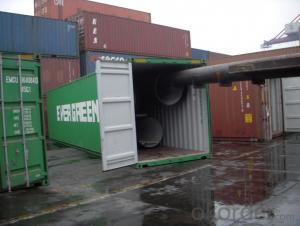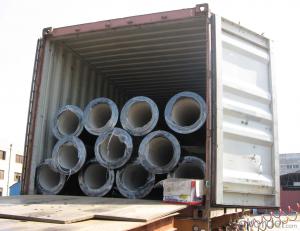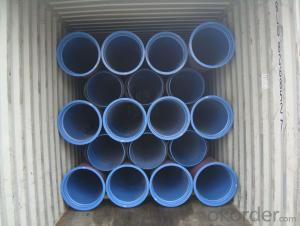DUCTILE IRON PIPES C Class DN700
- Loading Port:
- China Main Port
- Payment Terms:
- TT OR LC
- Min Order Qty:
- -
- Supply Capability:
- -
OKorder Service Pledge
OKorder Financial Service
You Might Also Like
Ductile Iron Cast Pipe is without any defects compare with tradition casting tech, which has many advantages particularly as follow:
(1) High density. In the "vertical upward casting" process, the melt iron of centre liquid column in center crystallizer is continuously feeding for volume shrinkage caused by condensation tube at outer circumference , which lead to be free of shrinkage porosity.
(2) High purity. When melt iron pouring, the mixed impurities such as gas, dross, sand grain which are lighter than melt iron could be eliminated at furnace mouth, its impossible to enter into the crystallizer through the channel, so the melt iron into the crystallizer is very pure.
(3) Strength with toughness. The cooling speed provided by continuous crystallizer is 30 times than sand casting and 5 times than centrifugal casting, and doesn't produce white iron, the eutectic cell volume of continuous cast iron is one eighth to one tenth compare with traditional cast iron. The density of graphite nodule in ductile iron can reach 300-700 pcs/mm2. Therefore, all reason above improve the strength and toughness of continuous cast iron.
(4) Free machining. The high speed cooling make the hardening phase (such as boride, steadite) not appear like reticular, massive or thick, but diffuse like fish bone and pane in shape, moreover, there are tiny graphite flakes inlaid hardening phase. It's free machining in BrinellHardness the range of 250-300HB. However, the Brinell Hardness of 250 is top limit to common metal materials.
(5) Uniform composition of tube wall. The convection mixing of liquid column caused by marching type drawing in crystallizer make the composition of tube wall well-distributed, and concentration gradient very little.
(6) High productivity. To the wall thickness of tube under 10mm, the speed of continuous casting is 1 meter/min, to the wall thickness of tube under 20mm, the speed of continuous casting is 0.5 meter/min, which is high efficiency that centrifugal or other casting tech couldn't reach.
- Q:Can ductile iron pipes be used for underground hydrocarbon pipelines?
- Yes, ductile iron pipes can be used for underground hydrocarbon pipelines. Ductile iron is a strong and durable material that is commonly used in various applications including water and sewage systems, gas pipelines, and even hydrocarbon pipelines. Ductile iron pipes have excellent corrosion resistance properties and can withstand high pressures, making them suitable for transporting hydrocarbons underground. However, it is important to consider factors such as the specific composition of the hydrocarbons being transported and the environmental conditions of the pipeline route to ensure proper material selection and corrosion protection measures are implemented.
- Q:Can ductile iron pipe be used for directional drilling?
- Yes, ductile iron pipe can be used for directional drilling. Directional drilling is a technique used to install underground pipes, cables, and conduits in a curved or horizontal path. Ductile iron pipes are known for their high strength and flexibility, making them suitable for this method. The pipes can be easily bent and maneuvered during the drilling process, allowing for the installation of pipelines in challenging terrains or crossing obstacles such as rivers, highways, and buildings. Additionally, ductile iron pipes have excellent resistance to corrosion, making them a durable and reliable choice for directional drilling projects.
- Q:Is the crankshaft material forged or ductile iron?
- Nodular cast iron, cast iron, forged steel crankshaft are used in the three. There are 3 kinds of axes in our company
- Q:What are the different methods for restraining ductile iron pipe?
- There exist various techniques for restraining ductile iron pipe to prevent any movement or displacement caused by internal pressure, external forces, or ground movement. The most commonly used approaches include: 1. Thrust blocks: Concrete blocks or structures are positioned at bends, tees, or other directional changes in the pipe. These blocks are designed to resist the forces exerted by flowing water or fluids within the pipe, effectively anchoring it in place. 2. Mechanical restraints: Harnesses or clamps are installed around the pipe and affixed to a fixed structure, such as a wall or concrete anchor. These restraints provide a physical barrier that prevents any movement or shifting of the pipe. 3. Pipe restraints: Devices directly attached to the pipe and anchored to a fixed structure, such as pipe clamps, restraints, or saddles. They are designed to securely hold the pipe in place and resist any movement or displacement. 4. Proper pipe bedding and backfill: It is crucial to properly support and surround the pipe with compacted material to prevent any movement or shifting. This method involves carefully placing and compacting soil or suitable materials around the pipe to provide stability and prevent displacement. 5. Trench walls: The walls of the trench where the ductile iron pipe is installed can also contribute to restraining it. By correctly compacting the soil against the pipe and ensuring proper stability of the trench walls, the pipe can be effectively restrained and prevented from moving. Overall, the various methods for restraining ductile iron pipe aim to ensure its secure placement without any displacement or movement. The choice of method depends on factors such as location, application, and the forces acting on the pipe. It is important to consult with engineers and adhere to industry guidelines and standards to determine the most appropriate method for restraining ductile iron pipe in specific situations.
- Q:How do ductile iron pipes perform in high-pressure applications?
- Ductile iron pipes are known for their exceptional strength and durability, making them highly suitable for high-pressure applications. These pipes are designed to withstand immense internal and external pressures, making them well-suited for underground or above-ground installations where high-pressure conditions are expected. One of the key advantages of ductile iron pipes in high-pressure applications is their ability to resist cracking or bursting. The inherent ductility of the material allows it to absorb and distribute the pressure evenly, minimizing the risk of failure under high-pressure conditions. This makes ductile iron pipes a reliable choice for water supply systems, oil and gas pipelines, and other applications where the pipe is subjected to significant pressure. Additionally, ductile iron pipes have excellent corrosion resistance properties, which further enhances their performance in high-pressure environments. The pipes are typically coated with a protective layer, such as cement mortar or epoxy, which acts as a barrier against corrosion. This protective coating prevents the formation of rust or scale inside the pipe, ensuring a smooth flow and maintaining the structural integrity even under high-pressure conditions. Furthermore, ductile iron pipes have a high tolerance for external loads, such as soil pressure, traffic loads, or other external forces. This strength enables them to withstand the additional stress that may be present in high-pressure applications, ensuring the long-term reliability and performance of the pipe system. Overall, ductile iron pipes offer exceptional performance in high-pressure applications. Their strength, durability, corrosion resistance, and ability to withstand external loads make them a reliable choice for various industries and infrastructure projects where high-pressure conditions are a concern.
- Q:What is the relationship between continuous cast iron pipe and ductile iron pipe?
- Continuous cast iron pipes are usually grey cast iron pipes. Its tensile strength and elongation are much lower than those of nodular cast iron. In chemical composition, grey cast iron has less carbon content than nodular cast iron. According to the organization, the graphite form of gray iron is flaky, and the graphite form in spheroidal graphite cast iron is spherical.
- Q:How do ductile iron pipes perform in seismic zones?
- Due to their unique characteristics and design features, ductile iron pipes have demonstrated exceptional performance in seismic zones. These pipes possess the ability to withstand ground movements, vibrations, and other seismic forces that may arise during an earthquake. The flexibility inherent in ductile iron pipes enables them to absorb and distribute the energy generated by seismic activities. This flexibility prevents the pipes from fracturing or breaking when subjected to intense ground shaking. Moreover, the high strength and resilience of ductile iron make it highly resistant to damage caused by ground movements. Furthermore, ductile iron pipes are designed with joints that are restrained, providing increased stability and resistance against seismic forces. These joints can accommodate small lateral movements without compromising the integrity of the pipeline system. Additionally, the restrained joints prevent the pipes from becoming disconnected or misaligned during seismic events, guaranteeing the uninterrupted flow of water or other fluids. In seismic zones where the ground is more susceptible to liquefaction or soil settlement, ductile iron pipes are often installed using methods that enhance their stability. For example, deep embedment techniques or the inclusion of thrust blocks at bends and fittings increase the pipes' resistance to lateral forces exerted by the ground. Regular inspection and maintenance further enhance the performance of ductile iron pipes in seismic zones. Periodic assessments can identify any potential weaknesses or damages that may have occurred during seismic events, enabling prompt repairs or replacements. Overall, ductile iron pipes have a well-established track record of reliable performance in seismic zones. Their flexibility, strength, and design characteristics make them highly resilient against seismic forces, ensuring the safe and uninterrupted supply of water or other fluids, even in earthquake-prone areas.
- Q:How much is a ductile iron pipe dn400?
- Ductile iron pipe nominal diameter is 80 ~ 2200 mm, compared with grey cast iron, high strength, good toughness, thin wall metal, less dosage, and can withstand high pressure, effective length of 5 meters, 6 meters and 8 meters; according to the different thickness of P, G two. It is the development direction of cast iron pipe.
- Q:Can ductile iron pipes be used for rainwater harvesting systems?
- Yes, ductile iron pipes can be used for rainwater harvesting systems. Ductile iron pipes are known for their durability and strength, making them suitable for various applications, including rainwater collection and storage. They can effectively transport rainwater from collection points to storage tanks, ensuring a reliable and efficient rainwater harvesting system.
- Q:Are ductile iron pipes suitable for horizontal directional drilling?
- Yes, ductile iron pipes are suitable for horizontal directional drilling due to their high strength and flexibility, which allows them to withstand the stress and bending forces during the drilling process.
1. Manufacturer Overview |
|
|---|---|
| Location | |
| Year Established | |
| Annual Output Value | |
| Main Markets | |
| Company Certifications | |
2. Manufacturer Certificates |
|
|---|---|
| a) Certification Name | |
| Range | |
| Reference | |
| Validity Period | |
3. Manufacturer Capability |
|
|---|---|
| a)Trade Capacity | |
| Nearest Port | |
| Export Percentage | |
| No.of Employees in Trade Department | |
| Language Spoken: | |
| b)Factory Information | |
| Factory Size: | |
| No. of Production Lines | |
| Contract Manufacturing | |
| Product Price Range | |
Send your message to us
DUCTILE IRON PIPES C Class DN700
- Loading Port:
- China Main Port
- Payment Terms:
- TT OR LC
- Min Order Qty:
- -
- Supply Capability:
- -
OKorder Service Pledge
OKorder Financial Service
Similar products
New products
Hot products
Related keywords



























